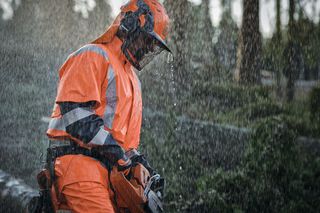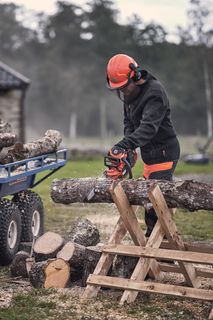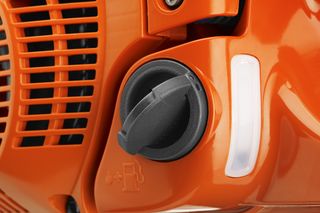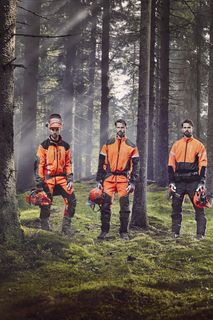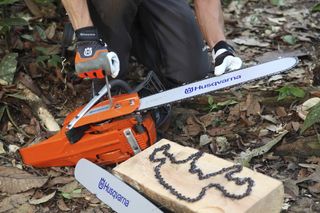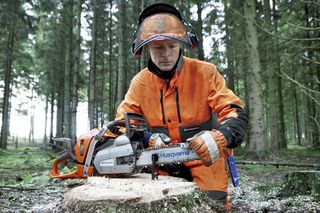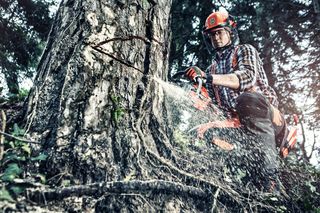
Sweden’s Pavel Hajman lends his support to SA’s fight against rhino poaching
Pavel Hajman, president of Husqvarna Division, Husqvarna Group in Sweden, visited South Africa this week to support a team helping in the battle against rhino poaching. During his trip to Husqvarna’s subsidiary in South Africa, he was part of a small group which witnessed Hilton veterinary surgeon Ryan Van Deventer dehorn a rhino at a small, exclusive game lodge in Mid-Illovo.
Also present was Stefan Terblanche, former Springbok rugby player and CEO of the Rugby Legends, who has added his voice to the anti-poaching chorus: “We must do all we can to reduce rhino poaching and I’m proud that we can help save the animal for future generations. It’s far better to have a dehorned rhino that is alive and that we can still enjoy seeing in our reserves,” he said.
The dehorning took place at the beautiful 700ha Gwahumbe Game & Spa in Mid-Illovo, KwaZulu-Natal, the latest private reserve to join the ranks of others which have dehorned their rhinos. Its partnership with Husqvarna and vet Ryan van Deventer will, hopefully, ensure the survival of the lodge’s last remaining male rhino, eight-year-old Vuyo – and finally allow the expansion of its herd.
Previously, said Gwahumbe Game & Spa director Shanon MacKenzie, “We were too anxious about Vuyo’s safety to allow him to be photographed, and we postponed adding to the herd because of the risk of poachers wanting their horns. We are extremely fond of him: he came here when he was just three. The decision to dehorn him was made with his survival and safety very much at the forefront of our minds.”
The devastating decline in the rhino population – and the poachers’ savagery– is just one of the issues on the agenda for this year’s CITES COP17 Conference* (24 September-5 October in Johannesburg). Sadly, the battle for the animal’s survival has been a losing one, until recently.
A local rhino-dehorning campaign, using Husqvarna outdoor power products, is proving highly successful in the bid to save these beautiful animals from poachers. In KwaZulu-Natal, particularly, the practice is gaining momentum, with increasing numbers of private game reserves voting for this option.
The process was first used to help reduce poaching pressure in Zimbabwe in the 1980s. When rhinos are dehorned professionally, the horn is taken above the growth layer of the skin. Rhino horn is like a fingernail: you can cut it or trim it without stopping continued growth. But poachers brutally uproot the entire horn from its base under the skin in the bone.
Van Deventer started working on the dehorning project a year ago in various KwaZulu-Natal areas, including, more recently, at the popular Gwahumbe Game & Spa.
“Before dehorning, many rhino owners used ankle bracelets and horn transmitters for monitoring purposes,” he said. “Although some of them are still resistant to dehorning, as the poaching problem escalates more and more reserves are realising they need to minimise the risk to the animals. It’s not a total solution to the problem but merely part of a holistic plan to try to prevent poaching.”
The Husqvarna Group, a global frontrunner in the manufacture of forest, agricultural and garden power products, has provided Van Deventer with a battery chainsaw and a petrol one – the petrol saw for the initial cutting, and the battery saw for the finer trimming.
Some vets who work with rhinos are also relying on Husqvarna’s battery blowers to keep the rhino cool during the dehorning process. Battery products are fuel free so produce no harmful emissions. They are also quieter than their petrol equivalents and lower noise levels mean less anxiety for the sedated animal.
“The Husqvarna chainsaw is quicker than an oscillating saw,” said Van Deventer. “Once the animal is immobilised and stable, the procedure takes about 20-30 minutes.” He said the Husqvarna blower played a vital role in keeping the rhino’s core body temperature down, which was particularly important during the procedure, especially in the hotter seasons. “There is always a risk with anaesthesia, and added to this is that white rhinos are particularly sensitive to the opioids. So we want to perform the dehorning as efficiently and quickly as possible.”
He said the recommended method to reduce poaching risk was to remove the horn as low to the base as possible, in addition to removing the side walls of the horn. “This just leaves a small rounded bump of horn, reducing the poaching risk to the animal.”
Horns do grow back with time, but the rate depends on nutrition. “Animals receiving a lot of supplementary feeding have faster horn growth, so dehorning every 15-24 months is a good guide. But saying that, it’s not good enough to merely dehorn and expect there to be no poaching threat: you must ensure other checks are also in place.”
In Vuyo’s case, ONLY battery-operated professional Husqvarna products were used, which are much quieter and thus less stressful for the animal.
Husqvarna South Africa’s marketing manager Jacqui Cochran said: “We are extremely committed to this project, and thrilled that our diverse range of equipment is being used for a cause as worthwhile as saving the rhino.”
For more information about Husqvarna, visit www.husqvarna.co.za and www.gwahumbe.co.za
===========
Ends
Editors’ notes
At the beginning of the 20th century, 500,000 rhinos wandered across Africa and Asia. This dropped to 70,000 by 1970 and today, in the wilds, only about 29,000 rhinos remain.
Since 2008, poachers have killed at least 5 940 African rhinos, and poaching is at crisis point. By the end of last year, the number of African rhinos killed by poachers had increased for the sixth year in a row, with at least 1,338 of them killed by poachers across Africa. One horn can sell for up to R150 000 locally, but fetch as much as R5 million in the East, where it is highly prized in traditional Asian medicine for treating various illnesses.
CITES (the Convention on International Trade in Endangered Species of Wild Fauna and Flora) is an international agreement between governments. Its aim is to ensure international trade in specimens of wild animals and plants does not threaten their survival.
| Press contact |
|---|
| Jacqui Cochran Marketing Manager, Husqvarna South Africa jacqui.cochran@husqvarnagroup.com +27 (0)33 846 9700 |

